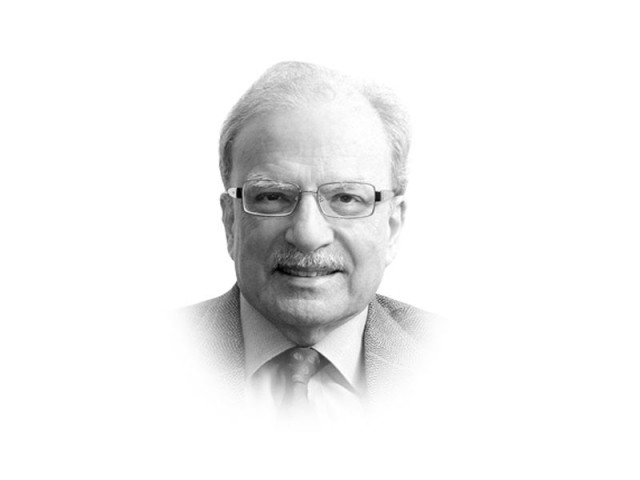Strongmen in Pakistan’s political history
There is a lesson for Pakistan to learn from the experience of Malaysia and South Africa

The writer is a former caretaker finance minister and served as vice-president at the World Bank
What does the above arithmetic suggest? Is the rule of strongmen in Pakistan’s political DNA? The above list of strong leaders reveals a few things immediately about the history of politics in Pakistan. One, the list has more strongmen clustered together in the first decade of independent Pakistan than in any other period. The reason for that is obvious. Strongmen gained power when political institutions were weak. Two, their rise reflected general despair among citizens about the direction in which the country was heading. While India across the border was able to give itself a constitution within four years of independence, Pakistan struggled to write the basic law throughout the first decade following independence.
It was only in 1956 that the country adopted a constitution but it had a short life. While India has allowed its constitution to evolve through a large number of amendments, Pakistan abrogated two constitutions, beginning each time with a clean slate. The third adopted in 1973 was suspended twice while the military governed. All this meant political lawlessness and disorder. Three, it was easier to concentrate power in one pair of hands when the prevailing worldview seemed to be in favour of authoritarian rule.
All three conditions have reappeared at this time as Pakistan prepares to hold another round of general elections. While this is indeed the case, I would argue that there are now countervailing forces within the political system that would most likely prevent the move towards authoritarianism. But before discussing the conditions that must prevail for Pakistan to buck the trend in some parts of the world I should say a word why authoritarianism is finding a way back into global politics.
There is now a virtual consensus among leading analysts that the old political order seems to have run its course. The enthusiasm for the old order began after the end of the Second World War and advanced further with the demise of the Soviet Union and the end of communism in Eastern Europe. It prompted thinkers such as Francis Fukuyama who argued that “history had ended.” In his book The End of History, Fukuyama suggested with the demise of the Soviet Union and Eurocommunism, Western liberal democracy had won and would now be unchallenged as the preferred system of governance. That prediction did not materialise as country after country in the West turned away from the old order. A big push in the direction came with the rise of Donald Trump in the United States.
But Trump is not the only reason for the seeming collapse of the old political order in the West. Some analysts such as Thomas Friedman believe that traditional politics hasn’t kept pace with all the change going on. We are going from an interconnected world to one that is interdependent. The former was the result of the process of globalisation, the latter is the consequence of the various ways that are linking the world’s many parts. Trade, financial flows and the movement of people across international borders have bound the world together. On top of all this is the rapid development of technologies. What could be done in Pakistan to keep moving towards the establishment of a democratic order on firm foundations.
First and foremost the desires of the young must be correctly read by the political establishment and appropriately accommodated. Today, Pakistan has one of the youngest populations in the world. The median age is only 24 years which means that more than 100 million people are below that age. The proportion of the youth is even higher in such large cities as Karachi and Lahore. It is possibly as high as 75 per cent of the total. That was made possible by the large-scale migration of the young from small cities and the countryside. The old political parties will need to take the changing demographics into account to remain relevant. Or else what the columnist Thomas Friedman sees happening in the West — the demise of old and large political parties, will also occur in Pakistan.
Second, institutions matter. The military prevailed in Pakistan on four occasions for the reason that it was the strongest institution in the country, stronger than the political parties, parliament and even the judiciary. For a while the Civil Service of Pakistan was the only institution that could match the strength of the military. This is the reason why there was a close working relationship between the two during the rule by some of the strongmen. My list of eleven strongmen has three civilian bureaucrats — Ghulam Muhammad, Iskander Mirza, and Ghulam Ishaq Khan — who, during their times, dominated politics. President Ayub Khan relied on a number of civil servants to run his government.
Third, an independent judiciary and free press are important in keeping in check any latent desire for strongman rule. The ongoing collaboration between the judiciary and the system of accountability may be setting the stage for Pakistan’s healthy political development. It was rampant corruption and self-indulgence by powerful elites that felled the strong and semi-authoritarian governments in Malaysia and South Africa. There is a lesson for Pakistan to learn from the experience of these two countries.
Published in The Express Tribune, July 9th, 2018.
Like Opinion & Editorial on Facebook, follow @ETOpEd on Twitter to receive all updates on all our daily pieces.















COMMENTS
Comments are moderated and generally will be posted if they are on-topic and not abusive.
For more information, please see our Comments FAQ